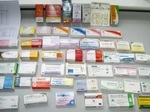Fake malaria drugs not as common as previously reported
20 April 2015

A rigorous analysis of antimalarial drug quality conducted in Cambodia and Tanzania found no evidence of fake medicines, according to new research published in the American Journal of Tropical Medicine and Hygiene. Researchers welcome reassuring findings but note poor quality drugs are still a problem.
Press release
Researchers warn that routine surveillance is crucial as poor quality medicines exist, leaving malaria patients at risk of dying and increasing the risk of drug resistance.
Previous reports had suggested that up to one third of antimalarials could be fake. Researchers from the Artemisinin-based Combination Therapy (ACT) Consortium at the London School of Hygiene & Tropical Medicine analysed 2,028 antimalarials from Tanzania and Cambodia. Samples were selected in a rigorous and representative way making this one of the most recent comprehensive data sets on antimalarial quality.
Drugs were analysed in three independent laboratories in the UK and USA and classed as acceptable quality, falsified (fake drugs which do not contain the stated active pharmaceutical ingredient or API) or substandard (genuine medicines produced by authorised manufacturers which do not have the correct amount of API).
No falsified drugs were found in either country. However, substandard drugs were found in 31% of samples in Cambodia and in 12% of samples in Tanzania.
In Tanzania, the study team used an “overt sampling” system, telling vendors that they were going to analyse the quality of their medicines. In Cambodia, researchers used overt sampling as well as a “mystery client” approach, where actors pretended to be patients with malaria, or their relatives, and bought the medicines offered to them. Both studies used a randomised approach to sampling of drug outlets, which differs from previous studies that mostly used non-representative methods for selecting drugs for analysis.
Dr Harparkash Kaur from the London School of Hygiene & Tropical Medicine, lead investigator of the drug quality programme of the ACT Consortium, said: “Although there have been alarming reports about the prevalence of fake antimalarials, our study provides ample data showing that the quality of drugs is not so bad based on comprehensive sampling and analysis presented here. This type of study is very cost intensive, both for the purchase and analysis of drugs. The lack of falsified medicines in Cambodia and Tanzania are reassuring, but the presence of substandard medicines is definitely a concern.”
Dr Shunmay Yeung from the London School of Hygiene & Tropical Medicine, lead author of the study in Cambodia – one of the epicentres of resistance to artemisinin – said: “Falsified medicines have received much attention globally, but substandard drugs are far more prevalent and of great concern. Not only do they leave patients with malaria undertreated, which could be fatal, but they may also contribute to the development of resistance to ACTs, the most effective drugs for malaria. Generally, the fact that no falsified antimalarials were identified reflects the positive impact of the country’s effort to control drug quality.”
Dr Catherine Goodman from the London School of Hygiene & Tropical Medicine, who led the study in Tanzania, said: “There is an urgent need to strengthen the capacity of national medicine regulation authorities to develop robust estimates of drug quality that are affordable, representative and timely. Our study saved costs by collecting samples within a nationally representative survey that was already in place.”
In Tanzania, one fourth of the 1,737 medicines analysed were prequalified by the World Health Organization, and these were less likely to be of poor quality than those not prequalified.
The lead investigators highlighted that results based on low cost convenience sampling approaches are still useful in drawing attention to the problem. However, alarming messages could be counter-productive by undermining the confidence in drugs and health care providers and systems.
These are the first published results from the ACT Consortium’s large drug quality programme, which analysed over 10,000 samples from malaria endemic countries over five years. Results from Nigeria, Equatorial Guinea, Ghana and Rwanda will be published in the next few months.
The ACT Consortium studies in Tanzania and Cambodia are funded by a grant from the Bill & Melinda Gates Foundation to London School of Hygiene & Tropical Medicine. The Cambodia study also received support from the UK Department for International Development.
Photo: Packets of artemisinin-containing antimalarials analysed by the ACT Consortium. Credit: Dr Harparkash Kaur
Further information
- Register to attend the drug quality meeting in Geneva on 28 May: "Fake antimalarials: Start with the facts"
- Read the results from the Cambodia study: "Quality of Antimalarials at the Epicenter of Antimalarial Drug Resistance: Results from an Overt and Mystery Client Survey in Cambodia" (AJTMH)
- Read the results from the Tanzania study: "Quality of Artemisinin-Containing Antimalarials in Tanzania’s Private Sector— Results from a Nationally Representative Outlet Survey"
- Learn more about the ACT Consortium drug quality programme
- Visit the American Journal of Tropical Medicine & Hygiene website
General Information
- Read an aritcle from the Washingtong post on the AJTMH Supplement on Falsified Medicines: Why researchers say fake and low-quality drugs are a ‘global pandemic’

